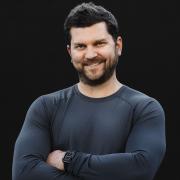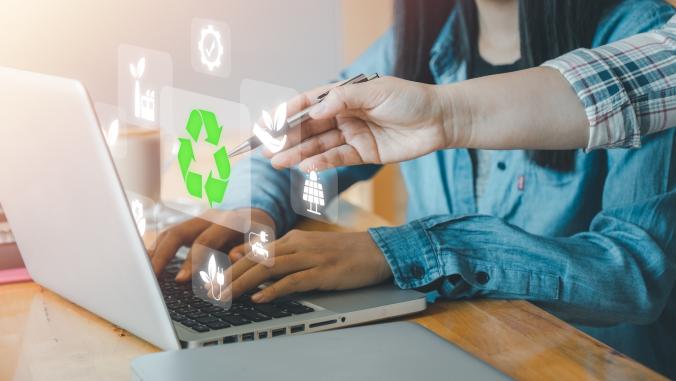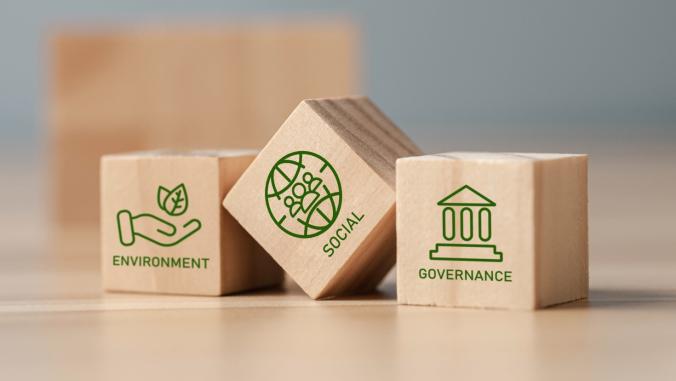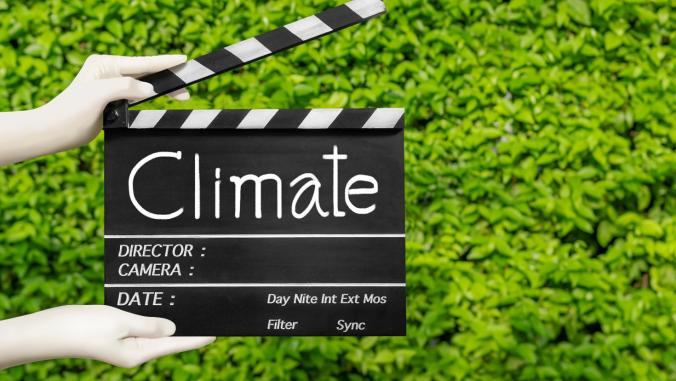'Silicon Savannah' startups innovate on resiliency
Kenya's tech hub is developing technologies to solve local problems with global impacts.

Children chewing on e-waste, garbage heaps two stories tall, rivers of human refuse — these are everyday sights in Mathare Valley, one of the worst slums in Nairobi, Kenya. More than 600,000 people — about the population of Boston — live in an area of only three square miles. They live in small shanties made of corrugated metal and mud; make due without running water or electricity; and most lack access modern toilets. It is the antithesis of resilient — a social and environmental sustainability nightmare.
But only a few miles away, in Nairobi’s bustling business district, others are living the dream. Amid the modern office buildings crowding the skyline, well-dressed business people frequent swanky Western restaurants and drive — or more often, are driven in — expensive cars. Nairobi is home to one of East Africa's highest concentrations of millionaires.
Although political leaders around the world are just beginning to draw the connection between the economy and climate change, another rising trend is threatening to compound the challenges raised by both — global inequality.
The world’s richest 1 percent currently own 48 percent of global wealth, according to a study (PDF) released last month by the charity Oxfam. The remaining 52 percent is owned by those included in the richest 20 percent, leaving only 5.5 percent for the remaining 80 percent of people in the world.
In other words: The 3.5 billion people making up the world’s poorest share about the same amount of wealth as that owned by the 80 wealthiest individuals on the planet ($1.9 trillion.) Oxfam projects that, by 2016, the richest 1 percent will control over 50 percent of global wealth.
Fight inequality, fight climate change
Tackling global inequality well may be the defining issue of of our time — any hope of mounting a meaningful response to climate change and building a more sustainable and resilient future could rest on it. As the World Resource Institute states in its Declaration on Climate Justice (PDF):
“The world cannot respond adequately to climate change unless people and communities are at the centre of decision-making at all levels — local, national and international. By sharing their knowledge, communities can take the lead in shaping effective solutions. We will only succeed if we give voice to those most affected, listen to their solutions, and empower them to act.”
But how can people in communities such as Mathare ever make their voices heard — particularly when governments are unwilling or unable to listen?
Information communication technology — specifically, mobile phones — may be part of the answer. Last year, the International Telecommunication Union predicted that, by the end of 2014, mobile-cellular subscriptions would reach almost 7 billion — subscriptions in the developing world accounted for 78 percent of this total.
In Mathare, for example, nearly 90 percent of the population already have Internet-enabled mobile phones, which has opened new channels of discourse for solving problems of community resilience.
Innovation in the Silicon Savannah
A Nairobi-based social enterprise called Spatial Collective has developed a free, downloadable app which allows users to use GPS to mark specific problems (such as the building-sized piles of garbage), and crowdsource which issues to resolve. The enterprise aggregates this data and, working with community partners on the ground, helps empower the people of Mathare to take collective action to identify and address the problem. This is done by taking the gathered information, showing the democratically elected Nairobi government the problem and offering local solutions.
"We are dealing with areas where there's very little data available, due to a lack of government interest in collecting it,” said Primoz Kovacic, co-founder and director of operations at Spatial Collective. “But information technologies are giving these marginalized populations the power to put themselves on the map, and create a sort of counternarrative to that of the state, saying, ‘We are here and we matter.’
“These data, collected by the communities about the communities, are a rich source of information about the so-called ‘local condition,’ which oftentimes reveals an astonishing array of self-organization initiatives and resilience to long or short-term shocks. I believe that by looking at how the most marginalized communities organize themselves in order to survive, without any outside interventions, we can learn a lot about community resilience and sustainability."
Nairobi's Innovation Hub
Spatial Collective is one of several emerging technology-focused social enterprises and nonprofits making up the Silicon Savannah — Nairobi’s burgeoning tech hub. Nairobi’s Innovation Hub, or iHub, founded in 2010 by Kenya-raised tech entrepreneur Erik Hersman, stands as the de facto epicenter of this growing tech-savvy region.
Resembling a typical Silicon Valley incubator, it is a place where local hackers, programmers and techies can gather to collaborate and innovate. Members also receive mentorship, Internet connectivity and the possibility of venture funding through connections with the international venture capital community.
Several start-ups residing at iHub are developing technologies aimed at improving community sustainability and resiliency in Nairobi and beyond. Take Ushahidi (Swahili for “testimony”), a nonprofit company founded by Hershman in 2008 to develop geo-mapping software to pinpoint violence during Kenya’s disputed 2007–08 presidential elections.
Since then, Ushahidi has evolved into a highly advanced open-source software provider, which has allowed users around the world to create interactive, crowdsourced maps addressing issues such as water availability, illegal land seizures and polluted waterways. To date, the organization has made possible the creation of more than 60,000 maps detailing environmental issues, elections and human rights abuses in 159 countries and 31 languages.
Invented in Kenya, used in the U.S.
Another iHub company, BRCK — launched by Ushahidi and also headed by Hersman — has developed a robust, portable Internet connectivity device designed to keep people connected in rural and urban areas where electricity and Internet connections are problematic. Although this hardware was designed with the developing world in mind, it also could prove useful as a standard emergency device during climate disasters in the United States.
No startup at iHub single-handedly will solve global inequality or climate change, but they are helping to build the tools needed to improve community sustainability and resiliency in both the developed and developing world. Most significant, these ICT-enabled innovations are making it easier than ever for populations to come together to take collective action to solve local social and environmental problems that their governments have been content to ignore.





